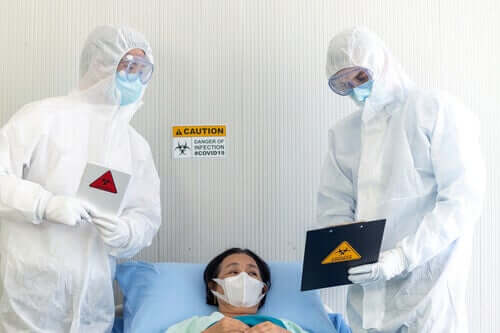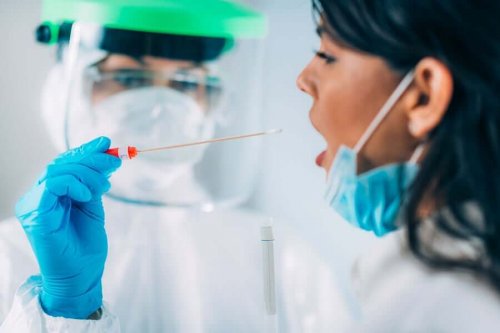The Importance of Protecting Health Care Workers During the Pandemic


Written and verified by the doctor Leonardo Biolatto
The high percentage of health care workers infected with coronavirus is very concerning. It highlights the unpredictability of various health care systems, as well as why protecting health care workers during the pandemic is so important.
The general director of the World Health Organization (WHO), Tedros Adhanom Ghebreyesus, has issued several statements calling on governments of nations hit by the COVID-19, to prioritize the protection of health care workers. He also said each country needs to evaluate risks, within its context.
Basic recommendations for health care personnel
The Ibero-American Social Security Organization has published a series of recommendations, aimed at protecting health care workers during the pandemic.
- The first measure is for health care providers to maximize hygiene measures, such as handwashing with soap and water for at least 25 seconds.
- Also, they need to use surgical masks when in contact with patients with respiratory symptoms. They will ask these patients to wear a mask as well, even if they don’t have coronavirus symptoms.
- To protect health care providers during a pandemic, they need to use correct personal protective equipment (PPE) when they are caring for patients that may have coronavirus.
- If health care workers contract a fever, cough or other COVID-19 symptoms, they need to stay at home. By doing this they’ll be able to monitor their situation and get tested.

Also read: Types of tests for detecting coronavirus
Risks that health care professionals are exposed to
The Ibero-American Social Security Organization has created three risk levels that health care workers are exposed to. Based on this, a series of recommendations have been published for each one.
This is so that completely adequate information will help to protect health care workers during the pandemic. The three levels are as follows:
- High-risk exposure. This is where staff have been in contact with confirmed or possible COVID-19 cases. For this reason, they need to wear a self-filtering protective mask, splash or drip protection, virus-protection gloves and a virus-resistant gown.
- Low-risk exposure. When they haven’t been in close contact with potential coronavirus patients.
- Finally, the low probability of exposure. This refers to staff that don’t work with the general public, and who keep a distance of 6 feet from other people, and take all necessary steps to avoid contact.
For the latter two, the Ibero-American Social Security Organization recommends regular hand washing and wearing surgical masks. These are designed to prevent contamination in the work environment during surgical procedures. They can also protect against biological fluid splashes.
Protecting health care workers during a pandemic: human rights
Amnesty International (AI) published a document, focusing on the human rights that everyone should take into account during the coronavirus pandemic. In this document, it refers to health care workers and the need to protect them during the pandemic.
It states that health care workers are on the front line tackling this pandemic because they have to continue providing their services despite putting themselves and their families at risk. This particularly puts them at risk of contracting coronavirus, but also from excessive working hours and consequent exhaustion.
It also stresses that governments need to provide them with good quality protective equipment. Also, information, training and psychological support so they can do their jobs efficiently. It also mentions that the families of health care workers need to have guaranteed support in the unfortunate event of them passing away.

This may interest you: Medication for COVID-19 currently in development
Economic support
Health care personnel in some countries are getting the recognition they deserve. This pandemic has highlighted the importance of health care professionals to society. For this reason, some governments have provided extra payments during the pandemic, but many others haven’t.
Having extra income, according to the country in question, aims to make sure health care workers have enough material resources during the pandemic. Also, it recognizes how essential this sector of professionals is to help mitigate the pandemic.
All cited sources were thoroughly reviewed by our team to ensure their quality, reliability, currency, and validity. The bibliography of this article was considered reliable and of academic or scientific accuracy.
- Cruz, M. P., Santos, E., Cervantes, M. V., & Juárez, M. L. (2020). COVID-19, una emergencia de salud pública mundial. Revista Clínica Española.
- Organización Mundial de la Salud. (3 de marzo de 2020). La escasez de equipos de protección personal pone en peligro al personal sanitario en todo el mundo. Recuperado el 31 de marzo de 2020 de https://www.who.int/es/news-room/detail/03-03-2020-shortage-of-personal-protective-equipment-endangering-health-workers-worldwide
- Organización Iberoamericana de Seguridad Social. (2020). Actuaciones del personal sanitario frente al Coronavirus COVID-19. Secretaría General OISS. Recuperado el 31 de marzo de 2020 de https://oiss.org/actuaciones-del-personal-sanitario-frente-al-coronavirus-covid-19/
- Amnistía Internacional España. (17 de marzo de 2020). AI presenta un decálogo de derechos humanos para afrontar la pandemia del coronavirus. Recuperado el 31 de marzo de 2020 de https://www.es.amnesty.org/en-que-estamos/noticias/noticia/articulo/amnistia-internacional-presenta-un-decalogo-de-derechos-humanos-para-afrontar-la-pandemia/
This text is provided for informational purposes only and does not replace consultation with a professional. If in doubt, consult your specialist.








